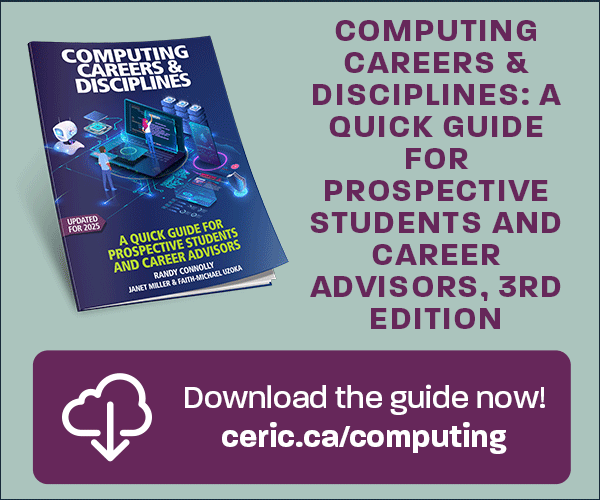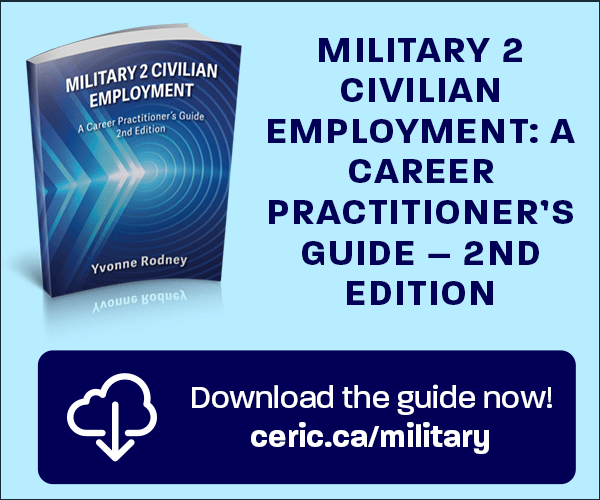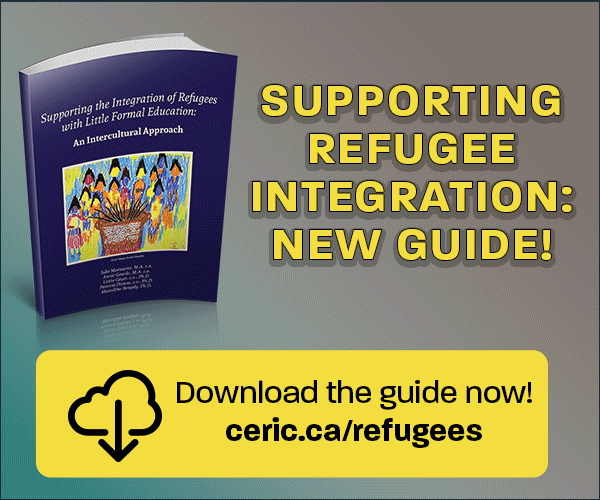Virtual Career Counselling Support: Ethical Reflections from Career Counsellors
DOI:
https://doi.org/10.53379/cjcd.2023.368Keywords:
Remote support, distance counselling, ethics, digital technologiesAbstract
The use of Information and Communication Technologies (ICT) has been an integral part of career development practice for over 40 years (Sampson et al, 2020). However, counselling at distance is a more recent phenomenon. Few career development practitioners were providing counselling at distance before the arrival of the COVID-19 pandemic (Ozenne et al, 2018; Turcotte & Goyer, 2017). Many authors point out the importance for practitioners to be trained in the ethical requirements relevant to these intervention modalities (Anthony, 2015; Bimrose et al, 2015; Haberstroh et al, 2008). Stories from 27 career counsellors were collected before the pandemic. Many testimonials referring to reflections of an ethical nature have been reported. We note that these professionals, subject to a code of ethics, are questioning the manner and the merits of intervening by using these modalities of distance intervention, whether through the use of videoconferencing, telephone or email exchanges.
References
Abbott, J., Klein, B., & Ciechomski, L. (2008). Best practices in online therapy. Journal of Technology in Human Services, 26 (2/4), 360-375. https://doi.org/10.1080/15228830802097257
Agathokleous, G. (2020). Mental health clinicians’motivation and awareness of key considerations as predictors of online therapy uses and applications. [Thèse de doctorat inédite]. Université de Wolverhampton.
Agathokleous, G., & Taiwo,A. (2022). How Online Counselling Is Utilised, Evaluated, and Received. Dans J. P. (Ed.), Digital Innovations for Mental Health Support (pp. 251-277. https://doi.org/10.4018/978-1-7998-7991-6.ch011. IGI Global.
American Counseling Association (ACA). (2014). Récupéré sur ACA Code of Ethics: https://www.counseling.org/resources/aca-code-of-ethics.pdf
Andrei, A., & Scoda, A. D. . (2017). How the potential of ICT is integrated in counselling and guidance throughout Romania. eLearning & Software for Education, 2.
Anthony, K. (2015). Training therapists to work effectively online and offline within digital culture. British Journal of Guidance and Counselling, 43(1), 36-42. https://doi.org/10.1080/03069885.2014.924617
Anthony, K., & Nagel, D-M. (2010). Therapy online : a practical guide. London: Sage publications.
Ariadne. (2004). Guidelines for web-based guidance. (A. Publishing, Producteur) Récupéré sur https://www.scribd.com/document/292027252/Ariadne-GUIDELINES-Final
Association canadienne de counselling et de psychothérapie. (2020). Lignes directrices concernant le recours des technologies en counseling et psychothérapie. Récupéré sur Association canadienne de counselling et psychothérapie: https://www.ccpa-accp.ca/wp-content/uploads/2019/04/TISCGuidelines_Mar2019_FR.pdf
Backhaus, A., Agha, Z., Maglione, M., Repp, A., Ross, B., Zuest, D., . . . Thorp, S. (2012). Videoconferencing Psychotherapy: A Systematic Review. Psychological Services, 9(2), 111-131. https://doi.org/10.1037/a0027924
Bakshi, A. J., & Goss, S. (2019). Trends related to ethics, technology, counselling and careers. British Journal of Guidance & Counselling, 47(3), 265-273. https://doi.org/10.1080/03069885.2019.1630603
Barak, A., Hen, L., Meyran, B.N., & Shapira, N. (2008). A comprehensive review and a meta-analysis of the effectiveness of internet-based psychotherapeutic interventions. Journal of Technology in Human Services, 26(2), 109-160. https://doi.org/10.1080/15228830802094429
Barnes, S.-A., Bimrose, J., Brown, A., Kettunen, J., & Vuorinen, R. (2020). Lifelong guidance policy and practice in the EU: trends, challenges and opportunities. (E. Commission, Producteur) Récupéré sur https://agence.erasmusplus.fr/wp-content/uploads/2020/04/LLLGuidance.pdf
Békés, V., & Aafjes-van Doorn, K. (2020). Psychotherapists’ attitudes toward online therapy during the COVID-19 pandemic. Journal of Psychotherapy Integration, 30(2), 238-247. http://doi.org/10.1037/int0000214
Bimrose, J., & Barnes, S.A. (2010). Labour market information (LMI), information communications and technologies (ICT) and information, advice and guidance (IAG): the way forward? A report prepared for the UK Commission for Employment and Skills, Wath-Upon-Dearne, South Yorkshire.
Bimrose, J., & Brown, A. (2019). Professional identity transformation: supporting career and employment practitioners at a distance. British Journal of Guidance & Counselling, 47(6), 757-769. https://doi.org/10.1080/03069885.2019.1698008
Bimrose, J., Hughes, D., & Barnes, S. (2011). ICT and Carrers practice: Extending the knowledge base. A report prepared for the UK Commission for Employment and Skills, Wath-upon-Dearne, South Yorkshire. https://warwick.ac.uk/fac/soc/ier/publications/2011/bimrose_2011_ict.pdf
Bimrose, J., Kettunen, J., & Goddard, T. (2015). ICT -the new frontiers? Pushing the boundaries of career practice. British Journal of Guidance and Counselling, 43 (1), 8-23. https://doi.org/10.1080/03069885.2014.975677
Butterfield, L., Borgen, W.A., Amundson, N.E. & Maglio, A.T. (2005). Fifty years of the Critical Incident Technique: 1954-2004 and beyond. Qualitative Research, 5, 475-497. https://doi.org/10.1177/1468794105056924
Butterfield, L., Borgen, W.A., Maglio, A.T., & Amundson, N.E. (2009). Using the Enhanced Critical Incident Technique in Counselling Psychology Research. Canadian Journal of Counseling, 43(4), 265-282.
Calbring, P., Andersson, G., Cuijpers, P., Riper, H., & Hedman-Lagerlof, E. (2018). Internet-based vs. face-to-face cognitive behavior therapy for psychiatric and somatic disorders: An updated systematic review and meta-analysis. Cognitive Behaviour Therapy, 47, 1–18. http://doi.org/10.1080/16506073.2017.1401115
Calkins, H. (2021). Online therapy is here to stay. Monitor on Psychology, 52(1), http://www.apa.org/monitor/2021/01/trends-online-therapy
Chester, A., & Glass, C.A. (2006). Online counselling: a descriptive analysis of therapy services on the internet. British Journal of Guidance and Counselling, 34(2), 145-160. https://doi.org/10.1080/03069880600583170
Childress, C. (2000). Ethical issues in providing online psychotherapeutic interventions. Journal of Medical Internet Research, 2(1), 1-5. https://doi.org/10.2196%2Fjmir.2.1.e5
Chipise, E.-M., Wassenaar, D., & Wilkinson, A. (2019). Towards new ethics guidelines: The ethics of online therapy in South Africa. South African Journal of Psychology, 49(3), 337–352.https://doi.org/10.1177/0081246318811562
Collerette, P. (2004). Étude de cas (méthode des). Dans A. M. (dir.), Dictionnaire des méthodes qualitatives en sciences humaines (pp. 92-95). Paris: Armand Colin.
Conseil interprofessionel du Québec. (2020). Recension des recommandations quant à la télépratique chez les ordres professionnels. Montréal: CIQ.
Conseil interprofessionnel du Québec et le Centre facilitant la recherche et l’innovation dans les organisations (CEFRIO). (2016). Percées du numérique dans la pratique professionnelle en santé mentale et relations humaines. https://numerique.banq.qc.ca/patrimoine/details/52327/2749506
Creswell, J. (2003). Research Design : qualitative, quantitative, and mixed methods approaches, second edition. Thousand Oaks, CA: Sage.
Deslauriers, J.-M., Deslauriers, J-P., & LaFerrière-Simard, M. (2017). La méthode de l’incident critique et la recherche sur les pratiques des intervenants sociaux. Recherches Qualitatives, 36(1), 94-112. http://www.recherche-qualitative.qc.ca/documents/files/revue/edition_reguliere/numero36/rq-36-1-deslauriers-et-al.pdf
Feijt, M. A., Kort, Y. A., de Bongers,I.M., & Ijsselsteijn, W.A. (2018). Perceived drivers and barriers to the adoption of emental health by psychologists: The construction of the levels of adoption of eMental health model. Journal of Medical Internet Research, 20(4), e153. https://doi.org/10.2196/jmir.9485
Felio, C., & Carayol, V. (2014). Apports de la technique des incidents critiques à l’étude des pratiques d’hyper connexion des cadres. , L’Harmattan, pp.229-237, 2013, Com. Dans Communication et débat public. Les réseaux numériques au coeur de la démocratie ? (pp229-237). L’Harmattan: Communication et civilisation. 978-2-343-01988-8..
Finn, J., & Barak.A. (2010). A descriptive study of e-counsellor attitudes, ethics, and practice. Counselling and Psychotherapy Research, 10(4), 268-277. https://psycnet.apa.org/doi/10.1080/14733140903380847
Flanagan, J. (1954). The critical incident technique. The Psychological Bulletin, 51(4), 327-358. https://www.apa.org/pubs/databases/psycinfo/cit-article.pdf
Fluckiger, C., Del Re, A.C., Wampold, B.E., & Horvath, A.O. (2018, May). The alliance in adult psychotherapy : a meta-analysis synthesis. Psychotherapy, 55(4), 316–340. https://doi.org/10.1037/pst0000172
Francis-Smith, C. (2014). Email counselling and the therapeutic relationship : a grounded theory analysis of therapists’experiences [Thèse de doctorat]. University of the West of England.
Gaggioli, A. (2018). The bright future of technology in mental health. Cyberpsychology, Behavior, and Social Networking, 21, 399–400. https://doi.org/10.1089/cyber.2018.29115.csi
Glasheen, K., Campbell, M.A., & Shochet, I. (2013). Opportunities and challenges : school guidance counsellors’perceptions of counselling students online. Australian Journal of Guidance and Counselling, 23(2), 22-235. https://psycnet.apa.org/doi/10.1017/jgc.2013.15
Godard, T. (2021). Online career learning: integrating ICT for service transformation [Thèse de doctorat]. University of Warwick. http://wrap.warwick.ac.uk/156331
Goss, S., & Anthony, K. (2003). Introduction. Dans S. Goss, & K. Anthony (Eds), Technology in counselling and psychotherapy : a practitioner’s guide (pp. 1-12). New York: Palgrave MacMillan.
Guba, E., & Lincoln,Y. S. (1982). Effective evaluation. San Franscisco, CA: Jossey Bass.
Haberstroh, S. (2009). Strategies and resources for conducting online counseling. Journal of Professional Counseling : Practice, Theory and Research, 37(2), 1-21. https://doi.org/10.1080/15566382.2009.12033857
Haberstroh, S., Parr, G., Bradley, L., Morgan-Fleming, B., & Gee, R. (2008). Facilitating online counseling : perspectives from counselors in training. Journal of Counseling & Development, 86(3), 460-470. https://doi.org/10.1002/j.1556-6678.2008.tb00534.x
Hanley, T., & Reynolds, D.J. (2009). Counselling psychology and the Internet : a review of the quantitative research into online outcomes and alliances with text-based therapy. Counselling Psychology Review, 24(2), 4-11.
Hanley, T., & Wyatt, C. (2020). A systematic review of higher education students’experiences of engaging with online therapy. Counselling and Psychotherapy Research, 21(4), P.1-13. https://doi.org/10.1002/capr.12371
Hanley, T., Prescott, J., & Gomez, U. (2019). A systematic review exploring how young people use online forums for support around mental health issues. Journal of Mental Health, 28(5), 566–576. https://doi.org/10.1080/09638237.2019.1630725
Huberman, M., & Miles, M.B. (1991). Analyse des données qualitatives : Recueil de nouvelles méthodes. De Boeck Université.
Hughes, D., & Gration, G. (2009). Literature review of research on the impact of careers and guidance-related interventions. Reading CfBT Education Trust.
Inchausti, F., MacBeth, A., Hasson-Ohayon, L., & Dimaggio, G. (2020). Telepsychotherapy in the age of COVID-19: A commentary. Journal of Psychotherapy Integration, 30(2), 394-405. http://doi.org/10.1037/int0000222
Irvine, A., Drew, P., Bower, H., Gellatly, J., Armitage,C.J., Barkham, M., . . . Bee, P. (2020). Are there interactional differences between telephone and face-to-face psychological therapy? A systematic review of comparative studies. Journal of Affective Disorders, 265, 120–131. https://doi.org/10.1016/j.jad.2020.01.057
Jarvis, P. (2012). Learning from everyday life. Human & Social Studies, Research and Practice, 1 (1), 1-20. http://hssrp.uaic.ro/continut/1.pdf
Kettunen, J., Sampson, J.P., & Vuorinen, R. (2015). Career practitioners’conceptions of competency for social media in career services. British Journal of Guidance and Counselling, 43(1), 43-56. http://doi.org/10.1080/03069885.2014.939945
Kettunen, J., & Makela, J.P. (2019). Practitioners’ conceptions of ethical practice in social networking in career services. International Journal of Educational and Vocational Guidance, 19, 345–362. https://doi.org/10.1007/s10775-018-9383-4
Kettunen, J., & Sampson, J.P. (2019). Challenges in implementing ICT in career services : perspectives from career development experts. International Journal of Educational and Vocational Guidance, 19, 1–18. https://doi.org/10.1007/s10775-018-9365-6
Kettunen, J., Vuorinen, R., & Sampson, J.P. (2013). Career practitioners’conceptions of social media in career services. British Journal of Guidance & Counselling, 41(3), 302-317. https://doi.org/10.1080%2F03069885.2013.781572
Kettunen, J., Vuorinen,R., & Ruusuvirta, O. (2016). European lifelong guidance policy network representatives’conceptions of the role of information and communication technologies related to national guidance policies. International Journal of Educational and vocational guidance, 16, 337-342. http://doi.org/10.1007/s10775-015-9313-7
Khan, S., Shapka, J.D., & Domene, J.S. (2022). Counsellors’ experiences of online therapy. British Journal of Guidance & Counselling, 50(1), 43-65. https://doi.org/10.1080/03069885.2021.1885009
King, R., Bambling, M., & Thomas, I. (2006). Telephone and online counseling: a naturalistic comparison of session outcome, session impact and therapeutic alliance. Counseling and Psychotherapy Research, 6(3), 175-181. https://doi.org/10.1080/14733140600874084
Kraus, R. (2011). Online counseling: does it work? Research findings to date. Dans R. Kraus, G. Sticker, & C. Speyer, Online counseling: a handbook for mental health professionnals (2nd edition p55-62),. Boston: Elsevier Academic Press. https://doi.org/10.1016/B978-0-12-378596-1.00003-4
Kiuru, N., Puolakanaho, A., Lappalainen, P., Keinonen, K., Mauno, S., Muotka, J., & Lappalainen, R. (2021). Effectiveness of a web-based acceptance and commitment therapy program for adolescent career preparation: a randomized controlled trial. Journal of Vocational Behavior, 127, https://doi.org/10.1016/j.jvb.2021.103578
Lazuras, L., & Dokou, A. . (2016). Mental health professionals’ acceptance of online counselling. Technology in Society, 44, 10–14. https://doi.org/10.1016/j.techsoc.2015.11.002
L’Écuyer, R. (s.d.). Méthodologie de l’analyse développementale de contenu: Méthode GPS et Concept de soi. Presses de l’Université du Québec.
Leclerc, C., Bourassa, B., & Filteau, O. (2010). Utilisation de la méthode des incidents critiques dans une perspective d’explicitation, d’analyse critique et de transformation des pratiques professionnelles. Éducation et francophonie, 38(1), 11-32. https://doi.org/10.7202/039977ar
Lescarbeau, R. (2000). La méthode de l’incident critique. Interactions, 4(1), 159-164. https://www.usherbrooke.ca/psychologie/fileadmin/sites/psychologie/espace-etudiant/Revue_Interactions/Volume_4_no_1/V4N1_LESCARBEAU_Robert_p159-164.pdf
Lustgarten, S. D., & Elhai, J. D. . (2018). Technology use in mental health practice and research: Legal and ethical risks. Clinical Psychology: Science and Practice, 25, 1–10. http://doi.org/10.1111/cpsp.12234
MacMullin, K., Jerry, P., & Cook, K. (2020). Psychotherapist experiences with telepsychotherapy: Pre COVID-19 lessons for a post COVID-19 world. Journal of psychotherapy Integration, 30(2), 248-264. http://doi.org/10.1037/int0000213
Maheu, M., Pulier, M.L., Wilhelm, F.H., McMenamin, J.P., & Brown-Connolly, N.E. (2005). The Mental Health Professional and the New Technologies : A Handbook for Practice Today. New Jersey: Lauwrence Erlbaum Associate.
Mallen, M., Jenkins, I., Vogel, D.L., & Day, S.X. (2011). Online counselling: An initial examination of the process in a synchronous chat environment. Counselling and Psychotherapy Research, 11(3), 220-227. https://doi.org/10.1080/14733145.2010.486865
Mallen, M., Vogel, D.L., & Rochlen, A.B. (2005). The practical aspects of online counselling : ethics, training, technology, and competency. Counseling psychologist, 33, 776-818. https://doi.org/10.1177/0011000005278625
Marcellis-Warin, N., & Mondin, C. (2021). Les pratiques numériques des professionnels au Québec : État des lieux et pistes de réflexion pour accompagner le virage numérique. Montréal: Conseil interprofessionel du Québec.
McCormick, R. (1994). The facilitation of healing for the First nations people of British Columbia [thèse de doctorat]. University of British Columbia, Vancouver.
Mialaret, G. (2011). Savoirs théoriques, savoirs scientifiques et savoirs d’action en éducation. Dans J.-M. Barbier, Savoirs théoriques et savoirs d’action (pp. 161-187). Paris: Presses Universitaires de France “ Education et formation”. Doi 10.3917/puf.barb.
Miles, M., & Huberman, A.M. . (2003). Analyse des données qualitatives (2e edition). Paris: De Boeck Universite.
Murphy, L., & Mitchell, D. (2009). Overcoming the absence of tone and non-verbal elements of communication in text-based cyber-counselling. Dans J. M. (Ed.), Studies in health technology and informatics (Vol. 143, pp. 215-219)). Amsterdam, The Netherlands: IOS Press BV.
Murphy, L., MacFadden, R., & Mitchell, D. (2008). Cybercounselling Online : The Development of a university-based training program for E-mail counselling. Journal of Technology in Human Services, 26(2), 447-469. https://doi.org/10.1080/15228830802102081
Murphy, L., Parnass, P., Mitchell, D., Hallett, R., Cayley, P., & Seagram, S. (2009). Client satisfaction and outcome comparisons of online and face-to-face counselling methods. British Journal of Social Work, 39, 627-640. https://doi.org/10.1093/bjsw/bcp041
National Career Development Association. (2015). NCDA Code of Ethics. https://www.ncda.org/aws/NCDA/asset_manager/get_file/3395
Ordre des conseillers et conseillères d’orientation du Québec. (2018). Code de déontologie des conseillers conseillères d’orientation du Québec. Récupéré sur Gazette Officielle du Québec: https://www.orientation.qc.ca/files/GOQ_D.1169-2018_CO_CodeDeonto_15aout2018-1.pdf
Ordre des conseillers et conseillères d’orientation du Québec. (2020). Guide explicatif du Code de déontologie de l’OCCOQ. https://docs.google.com/document/d/1U2z-h23sUhrKfbko1yqDtBAV0WFZNIWsLH1YPOahJmY/edit
Organisation mondiale de la santé. (2020). Projet de stratégie mondiale pour la santé numérique 2020-2025. https://www.who.int/docs/default-source/documents/200067-lb-full-draft-digital-health-strategy-with-annex-cf-6jan20-cf-rev-10-1-clean-fr.pdf?sfvrsn=4b12a8a7_2
Ozenne, R., Terriot, K., Spirito, V., Laeuffer, C., Lhotellier, L., & Bernnaud, J-L. (2018). Intention d’usage des nouvelles technologies dans le conseil en orientation : perceptions des professionnels et des bénéficiaires. Le travail humain, 81(2), 115-141. http://doi.org/10.3917/th.812.0115
Pordelan, N., Sadeghi, A., Abedi, M. R., & Kaedi, M. (2020). Promoting student career decision-making self-efficacy: an online intervention. Education and Information Technologies : The Official Journal of the Ifip Technical Committee on Education, 25(2), 985–996. https://doi.org/10.1007/s10639-019-10003-7
Pordelan, N., & Hosseinian, S. (2021). Online career counseling success: the role of hardiness and psychological capital. International Journal for Educational and Vocational Guidance, 21(3), 531–549. https://doi.org/10.1007/s10775-020-09452-1.
Pordelan, N., & Hosseinian, S. (2022). Design and development of the online career counselling: a tool for better career decision-making. Behaviour & Information Technology, 41(1), 118–138. https://doi.org/10.1080/0144929X.2020.1795262
Pulat, M., & Barutçu-Yıldırım, F. (2021). Online counseling and ethics: A systematic review of empirical research. The Journal of Clinical and Mental Health Counseling, 1(2), 1-12. https://bit.ly/Online_Counseling_and_Ethics_A_Systematic_Review_of_Empirical_Research
Reese, R., Conoley, C.W., & Brossard, D.F. (2006). The attractiveness of telephone counseling: an empirical investigation of client perceptions. Journal of Counselling and Development, 84(1), 54-60. https://doi.org/10.1002/j.1556-6678.2006.tb00379.x
Reynolds, D. J., Stiles, W. B., Bailer, A. J., & Hughes, M. R. (2013). Impact of exchanges and client-therapist alliance in onlinetext psychotherapy. Cyberpsychology, Behavior & Social Networking, 16, 370–377. https://doi.org/10.1089/cyber.2012.0195
Richards, D., & Vigano, N. (2013). Online counseling : a narrative and critical review of the literature. Journal of Clinical Psychology, 69(9), 994-1011. https://doi.org/10.1002/jclp.21974
Riegler, J., Raj, J., Moscato, S.P., Narad, E.L., Kincaid, M.E., & Wade, S. L. (2020). Pilot trial of a telepsychotherapy parenting skills intervention for veteran families: Implications for managing parenting stress during COVID-19. Journal of Psychotherapy Integration, 30(2), 290-303. http://doi.org/10.1037/int0000220
Sampson, J. (2002). Quality and ethics in internet-based guidance. International Journal for Educational and Vocational Guidance, 2, 147-171. http://doi.org/10.1023/A:1020665316813
Sampson, J., & Makela, J.P. (2014). Ethical issues associated with information and communication technology in counseling and guidance. International Journal for Educational and Vocational Guidance, 14(1), 135-148. http://doi.org/10.1007/s10775-013-9258-7
Sampson, J., Kettunen, J., & Vuorinen, R. (2020). The role of practitioners in helping persons make effective use of information and communication technology in career intervention. International Journal of Educational and Vocational Guidance, 20, 191-208. https://doi.org/10.1007/s10775-019-09399-y
Santilli, S., Ginevra, M. C., Di Maggio, I., Soresi, S., & Nota, L. (2022). In the same boat? an online group career counseling with a group of young adults in the time of covid-19. International Journal for Educational and Vocational Guidance, 22(3), 623–641. https://doi.org/10.1007/s10775-021-09505-z
Savard, R., Gingras, M., & Turcotte, M. (2002). Delivery of career development information in the context of information computer technology. International Journal for Educational and Vocational Guidance, 2(3), 173-191. http://doi.org/10.1023/A:1020659801270
Savoie-Zajc, L. (1997). L’entrevue semi-dirigée. Dans B. G. (Dir.), Recherche sociale. De la problèmatique à la collecte des données (pp. 263-285). Sainte-Foy, Québec: Presses de l’Université du Quebec.
Schön, D. (1994). Le praticien réflexif. À la recherche du savoir caché dans l’agir professionnel. Montréal: Éditions Logiques.
Serrat, O. (2010). The critical incident technique. Knowledge Solutions, 86, 1-6. https://doi.org/10.1007/978-981-10-0983-9_123
Stoll, J., Müller, J. A., & Trachsel, M. (2020). Ethical issues in online psychotherapy: A narrative review. Frontiers in Psychiatry, 10, article 993. https://doi.org/10.3389/fpsyt.2019.00993
Suler, J.-R. (2006). The Psycholoy of cyberspace. http://users.rider.edu/~suler/psycyber/psycyber.html
Suler, J.-R. (2016). Psychology of the digital age : Humans become electric. New York: Cambridge University Press.
Talbot, F., LeBlanc, J., & Jbilou, J. (2015). La thérapie informatisée : une option pouvant faciliter l’accès à la thérapie chez les jeunes adultes? Santé mentale au Québec,, 40(4), 217–227. https://doi.org/10.7202/1036101ar
Thivenaz, J. (2013). La transformation des habitudes d’orientation de l’action : le travail silencieux de l’expérience. Dans J.-M. Barbier, & J. Thievenaz (Eds), Le travail de l’expérience. Paris: L’Harmattan, Collection Action et Savoir.
Thievenaz, J. (2012). Construction de l’expérience et transformation silencieuse des habitudes d’orientation de l’action: le cas des médecins du travail. Paris: CNAM.
Thul-Sigler, A., & Colozzi, E. A. (2019). Using values-based webinar interventions to facilitate career-life exploration and planning. The Career Development Quarterly, 67(3), 271–278. https://doi.org/10.1002/cdq.12196
Turcotte, M (s. d.). Une analyse du transfert et de production de savoirs professionnels dans les pratiques d’accompagnement à distance en orientation [Thèse de doctorat], Université Laval.
Turcotte, M. (2020). Guide de l’usage des technologies numériques en orientation. https://www.orientation.qc.ca/files/GuideUsageTechno_OCCOQ_MAJ-_web.pdf
Turcotte, M. & Goyer, L. (2023 sous presse). Accompagnement à distance en orientation : quels savoirs professionnels? Oriention scolaire et professionnelle.
Turcotte, M., & Goyer, L. (2017). L’utilisation des technologies de l’information et des communications dans la pratique des conseillers et conseillères d’orientation du Québec. Revue canadienne de développement de carrière, 16(2), 6-11. https://cjcd-rcdc.ceric.ca/index.php/cjcd/article/view/111
Van Daele, T., Karekla, M., Kassianos, A. P., Compare, A., Haddouk, L., Salgado, J., & De Witte, N. A. J. (2020). Recommendations for policy and practice of telepsychotherapy and e-mental health in Europe and beyond. Journal of Psychotherapy Integration, 30(2), 160-173. http://doi.org/10.1037/int0000218
Van der Maren, J.-M. (2004). Méthodes de recherche pour l’éducation. Presses de l’Université de Montréal/De Bœck Université.
Venable, M. (2010). Using technology to deliver career development services: supporting today’s students in higher education. Career Development Quarterly, 59, 87-93. http://doi.org/10.1002/j.2161-0045.2010.tb00132.x
Villeneuve, N. (2019). Usages des contenus numériques en orientation scolaire et professionnelle auprès des élèves du secondaire. [Mémoire de maîtrise].
Vis, C., Mo, M., Kleiboer A., Buhrmann, L., Finch, T., Smith, J., & Riper, H. (2018). Improving Implementation of eMental Health for Mood Disorders in Routine Practice: Systematic Review of Barriers and Facilitating Factors. Journal Medical Internet ResearchMental Health, 5(1), e20. https://doi.org/10.2196/mental.9769
Vuorinen, R., Sampson, J.P., & Kettunen, J. (2011). The perceived role of technology in career guidance among practitioners who are experienced internet users. Australian Journal of Career Development, 20(2), 39-46. http://doi.org/10.1177/103841621102000307
Watts, A. (2002). The role of information and communication technologies in integrated career information and guidance systems. International Journal for Educational and Vocational Guidance, 2(3), 139-155. https://www.oecd.org/education/research/2698249.pdf
Watts, S., Marchand, A., Bouchard, S., & Bombardier, M. (2016). L’alliance thérapeutique lors d’une télépsychothérapie par vidéoconférence pour un trouble du spectre anxieux : recension systématique des écrits. Revue québécoise de psychologie, 37(3), 277-302. https://doi.org/10.7202/1040171ar
Wentzel, J., van der Vaart, R., Bohlmeijer, E. T., & van Gemert-Pijnen, J. E. . (2016). Mixing online and face-to-face therapy: How to benefit from blended care in mental health care. Journal of Medical Internet Research Mental Health,, 3(1), e9. https://doi.org/10.2196/mental.4534
Willis-O’Connor, S., Landine, J., & Domene, J. F. (2016). International students’ perspectives of the helpful and hindering factors of the therapeutic relationship [Special supplementary issue]. Canadian Journal of Counselling and Psychotherapy,, 50(3S), S156–S174. http://cjc-rcc.ucalgary.ca/cjc/index.php/rcc/issue/archive.
Wilson, L. A., White, K. M., & Hamilton,K. (2013). Predicting psychologists’ intentions to integrate complementary and alternative therapies into their practice. Australian Psychologist, 48(2), 149–158. https://doi.org/10.1111/j.1742-9544.2011.00058.x
Wind, T. R., Rijkeboer, M., Andersson, G., & Riper, H. . (2020). The COVID-19 pandemic: The ‘black swan’ for mental health care and a turning point for e-health. Internet Interventions, 20. https://doi.org/10.1016%2Fj.invent.2020.100317

Downloads
Published
How to Cite
Issue
Section
License
Copyright (c) 2023 Canadian Journal of Career Development

This work is licensed under a Creative Commons Attribution-NonCommercial-NoDerivatives 4.0 International License.
















